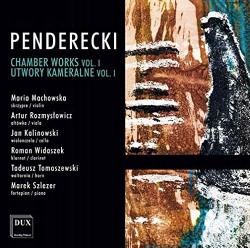
|
Krzysztof PENDERECKI (b.1933)
Chamber Works - Vol. 1
Three Miniatures for Clarinet and Piano (1956) [4:13]
Cadenza for solo violin (1983) [6:29]
Chaconne in memoriam John Paul II, for violin and viola (2005) [6:20]
Per Slava for solo cello (1986) [6:02]
Capriccio per Radovan for solo horn (2012) [3:36]
Prelude for Solo Clarinet (1987) [3:13]
Sextet for Clarinet, Horn, Violin, Viola, Cello and Piano (2000) [31:06]
Roman Widaszek (clarinet), Tadeusz Tomaszewski (horn), Maria Machowska (violin), Artur Rozmysłowicz (viola), Jan Kalinowski (cello), Marek Szlezer (piano)
rec. no date specified, European Music Centre in Lusławice, Poland.
DUX 0780 [60:58]
Penderecki’s chamber music is mostly of recent vintage. There were some earlier chamber works, such as the first two string quartets, but the second of those was in 1968, and a third was added only in 2008. On this disc, only the three miniatures for clarinet and piano are early works, written while the composer was still studying in 1956. The other items are four short solos for clarinet, horn, cello, and violin, a duo for violin and viola, and one substantial piece, a Sextet which brings all those instruments together with a piano.
The solos were written for musician colleagues, all of whom are clearly virtuosi – Per Slava was written for Rostropovich for instance. Each is impressive on a first hearing, and very impressively performed by a group of superb Polish musicians but they are more likely to be enjoyed live as brilliant encores perhaps than played very much on a disc at home. That is less true though of the Chaconne (Ciaconna), the last movement of Penderecki’s Polish Requiem commemorating tragic events in the modern history of Poland. The Chaconne was added to the score of the Requiem when Penderecki learned of the passing of Pope John Paul II. It is heard here in the composer’s own arrangement for violin and viola, which is very effective. It is the most haunting and immediately engaging piece on the disc.
The Sextet has two movements, the second of them playing for twenty of the piece’s thirty minutes. For those unfamiliar with any Penderecki, it might be worth noting that the idiom is modernist, and should present no difficulty to admirers of Bartók or Prokofiev, although it is Shostakovich in his ‘grotesque’ vein who is recalled at times in this Sextet. It is true chamber music, in which the instruments are mostly treated independently, and which fully exploits the range of colours they present, but makes no attempt to use them together to produce a quasi-orchestral sound. The work does not yield up its secrets at once, but repays several hearings and is the main reason for the general collector to hear this CD. The writer of the booklet notes Marcin Krajewski considers the Sextet to be Penderecki’s most important chamber work. Those notes are generally very helpful, if at times ill-translated.
The recorded sound is very good, in a suitably sized-acoustic for the small forces, and with the instruments positioned fairly closely, but not so close as to tire the ear. The disc is labelled “Chamber works, Vol. 1” and we should hope the next volume will follow soon.
Roy Westbrook
 |
 |
|
